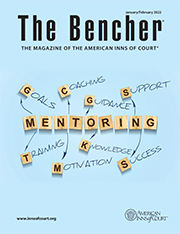Resources for Judicial Ethics Research
The Bencher—January/February 2022
By Francis G.X. Pileggi, Esquire

 This short ethics column will provide a few resources for those who might have occasion to engage in research on judicial ethics. Over the past 24 years or so that I have written this ethics column, I have focused on those who sit in front of the judicial bench. In July 2012, my ethics column on these pages was titled “Resources for Legal Ethics Research.” Only a few of these columns have focused on the judicial side of the bench. See, e.g., “What Is the Remedy for Appellate Judicial Bias,” The Bencher (Sep/Oct 2020); “Status as Facebook Friend Not Per Se Basis to Disqualify Judge,” The Bencher (May/Jun 2019); “ABA Issues Opinion on Judge’s Use of Internet for Factual Research,” The Bencher (May/Jun 2018); and “Professionalism and Judges,” The Bencher (Jul/Aug 2015).
This short ethics column will provide a few resources for those who might have occasion to engage in research on judicial ethics. Over the past 24 years or so that I have written this ethics column, I have focused on those who sit in front of the judicial bench. In July 2012, my ethics column on these pages was titled “Resources for Legal Ethics Research.” Only a few of these columns have focused on the judicial side of the bench. See, e.g., “What Is the Remedy for Appellate Judicial Bias,” The Bencher (Sep/Oct 2020); “Status as Facebook Friend Not Per Se Basis to Disqualify Judge,” The Bencher (May/Jun 2019); “ABA Issues Opinion on Judge’s Use of Internet for Factual Research,” The Bencher (May/Jun 2018); and “Professionalism and Judges,” The Bencher (Jul/Aug 2015).
Judicial ethics does not enjoy the same volume of learned commentary in the way legal ethics focusing on lawyers does, although a little more than a year ago there was much written in trade publications and the mainstream press about a decision by the Judicial Conference, a policy-making arm of the federal judiciary, which abandoned a proposal to prohibit federal judges from membership in certain groups of lawyers such as the Federalist Society or the American Constitution Society. See “Judges Not Barred from Federalist Society, ACS Membership,” Madison Alder, Bloomberg Law (July 30, 2020). See generally Rules of the Judicial Council of the United States Court of Appeals for the Third Circuit Governing Complaints of Judicial Misconduct or Disability. Of course, in the realm of federal judges, ultimately the United States Congress has the supreme authority to the extent that it has the power to impeach federal judges in extreme cases.
On a state level, each state has its own system for regulating judges. The National Center for State Courts hosts a Center for Judicial Ethics, which has a website that lists the entity in each state that provides advisory opinions to state judges. The Center for Judicial Ethics also sponsors a blog that provides updates on developments regarding judicial ethics.
In Delaware, for example, there is a Court on the Judiciary that reviews complaints against judges. There is also a separate Delaware Judicial Ethics Advisory Committee that allows judges to seek advice prospectively regarding whether certain behavior is consistent with the Code of Judicial Conduct. This is akin to the Professional Ethics Committee of the Delaware State Bar Association, which also provides a similar service to lawyers.
The website for the Delaware Court on the Judiciary provides sanitized summaries of selected decisions that offer insights into the types of issues that it decides. The website of the Delaware Judicial Ethics Advisory Committee also publishes decisions—with names redacted—that are also a useful source for interpretations of the Delaware Judges’ Code of Conduct. See generally Delaware Judicial Ethics Advisory Committee Rule 4(b) (only allows the committee to issue opinions that address contemplated or proposed future conduct).
Some of the decisions of the Delaware Judicial Ethics Advisory Committee are available on Westlaw. See, e.g., Del. Jud. Ethics Adv. Comm., Op. 1998-3, 1998 WL 35398038 (Feb. 18, 1998) (Deciding that a judicial officer was able to participate in a band that also raised money for charitable activities, as the judicial officer was not personally soliciting funds). The Delaware Judicial Ethics Advisory Committee also issues opinions on whether prospective conduct complies with the Delaware Code of Conduct for Law Clerks.
Another example of a decision by the Delaware Judicial Ethics Advisory Committee involved whether a judge was required to disqualify himself after recently learning that the father of a prospective witness was a painting subcontractor completing painting work on the judge’s home. See Del. Jud. Ethics Adv. Comm., No. JEAC 1997-4 (October 20, 1997). The committee’s decisions include citations to treatises such as Jeffrey M. Shaman, et al., Judicial Conduct and Ethics; and Richard E. Flamm, Judicial Disqualification, as well as court decisions and committee opinions from Delaware and other states.
Other treatises on the topic include Keith Swisher, Judicial Ethics (2016) and Joel Fishman, Judicial Ethics and Discipline: A Legal Research Guide (2020). Among the law schools that have online resources on legal ethics, and by extension judicial ethics, are Cornell Law School’s Legal Information Institute and Georgetown Law Library’s Legal Ethics and Legal Profession Research Guide. They both compile links to a wealth of resources, at least some of which are relevant to this topic. See generally American Bar Association (ABA)/Bloomberg Law Lawyers’ Manual on Professional Conduct. Naturally, links to Westlaw and LEXIS are provided as well.
The ABA maintains a website titled Judicial Codes and Rules, which compiles multiple online resources about judicial ethics. Law review articles should also be considered. The United Nations publishes materials on the topic, though its focus seems to be primarily directed toward promoting an independent judiciary in countries where that is a foreign concept.
Although I expect that most readers will rarely have the need to do research on judicial conduct, it should be useful to have a compilation of resources that is not otherwise readily available.
Francis G.X. Pileggi, Esquire, is the managing partner of the Delaware office of Lewis Brisbois Bisgaard & Smith, LLP. His email address is Francis.Pileggi@LewisBrisbois.com. He comments on key corporate and commercial decisions and legal ethics topics at www.delawarelitigation.com.